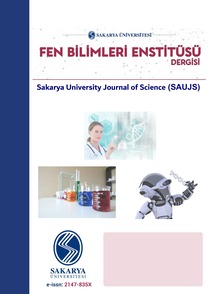A GIS-Based Comparison of Statistical Methods for Identifying Quality of Life Index in The Provinces of Turkey
___
[1] A. Çağlar, "İllerin Yaşam Kalitesi: Türkiye İstatistik Kurumu Verileriyle Veri Zarflama Analizi’ne Dayalı Bir Endeks," Eskişehir Osmangazi Üniversitesi İİBF Dergisi, vol. 15, no. 3, pp. 875-902, 2020.[2] WHO, "WHOQOL Measuring Quality of Life," World Health Organization Division of Mental Health and Prevention of Substance Abuse, Geneva, Switzerland, 1997.
[3] M. Şeker, "Quality of Life Index: A Case Study of Istanbul," Ekonometri ve İstatistik, no. 23, pp. 1-15, 2015.
[4] C. Geray, "Kentsel Yaşam Kalitesi ve Belediyeler," Türk İdare Dergisi, no. 421, p. 323–345, Aralık 1998.
[5] S. Alpaykut, Journal of Süleyman Demirel University Institute of Social Sciences, vol. 4, no. 29, pp. 367-395, 2017.
[6] TURKSTAT, "Well-Being Index for Provinces," 2020. [Online]. Available: https://turkstatweb.tuik.gov.tr/PreTablo.do ?alt_id=1106.
[7] Başarsoft, "Coğrafi Bilgi Sistemleri (CBS) Nedir?," Ankara, 2020.
[8] A. Apaydın and Ö. Türkşen, "ÇOK ÖLÇÜTLÜ KARAR VERME YÖNTEMLERİ - II," 2020. [Online]. Available: https://acikders.ankara.edu.tr/course/view. php?id=5704.
[9] M. Monjezi, H. Dehghani, T. N. Singh, A. R. Sayadi and A. Gholinejad, "Application of TOPSIS method for selecting the most appropriate blast design," Arabian Journal of Geosciences, vol. 5, pp. 95-101, 2012.
[10] A. Charnes, W. Cooper and E. Rhodes, "Measuring the efficiency of decision making units," European Journal of Operational Research, vol. 2, no. 6, pp. 429- 444, 1978.
[11] S. Opricovic and G. H. Tzeng, "Compromise Solution by MCDM Methods: A Comparative Analysis of VIKOR and TOPSIS," European Journal of Operational Research, vol. 106, no. 2, pp. 445-455, 2004.
[12] H. Dinçer and A. Görener, "Performance Evaluation Using AHP-VIKOR and AHPTOPSIS Approaches: The Case of Service Sector," Journal of Engineering and Natural Sciences, pp. 244-260, 2011.
[13] M. T. Chu, J. Shyu, G. H. Tzeng and R. Khosla, "Comparison Among Three Analytical Methods for Knowledge Communities Group Decision Analysis," Expert Systems with Applications, vol. 33, no. 4, pp. 1011-1024, 2007.
[14] S. Opricovic and G. H. Tzeng, "Extended VIKOR Method in Comparison with Other Outranking Methods," European Journal of Operational Research, vol. 178, no. 2, pp. 514-529, 2007.
[15] H. U. Yüce, "Türkiye'deki Yaşanılabilir İller Sıralaması," Dış Ticaret Enstitüsü, 2018.
[16] M. K. Ghorabaee, E. K. Zavadskas, L. Olfat and Z. Turskis, "Multi-Criteria Inventory Classification Using A New Method of Evaluation Based on Distance From Average Solution (EDAS)," Informatica, vol. 26, no. 3, pp. 435-451, 2015.
[17] E. Çakır, "Elektronik Belge Yönetim Sistemi (Ebys) Yazılımı Seçiminde Çok Kriterli Karar Verme Yöntemleri: Bir Belediye Örneği," Business, Economics and Management Research Journal, vol. 1, no. 1, pp. 15-30, 2018.
[18] C. Kahraman, M. K. Ghorabaee, E. K. Zavadskas, S. C. Onar, M. Yazdani and B. Oztaysi, "Intuitionistic fuzzy EDAS method: An application to solid waste disposal site selection," Journal of Environmental Engineering and Landscape Management, vol. 25, no. 1, pp. 1-12, 2017.
[19] S. H. Zolfani, M. H. Aghdaie, A. Derakhti, E. K. Zavadskas and M. H. M. Varzandeh, "Decision making on business issues with foresight perspective: An application of new hybrid MCDM model in shopping mall locating," Expert systems with applications, vol. 40, no. 17, pp. 7111-7121, 2013.
[20] E. K. Zavadskas, Z. Turskis, J. Antucheviciene and A. Zakarevicius, "Optimization of weighted aggregated sum product assessment," Elektronika ir elektrotechnika, vol. 122, no. 6, pp. 3-6, 2012.
[21] S. Lashgari, J. Antuchevičienė, A. Delavari and O. Kheirkhah, "Using QSPM and WASPAS methods for determining outsourcing strategies," Journal of Business Economics and Management, vol. 15, no. 4, pp. 729-743, 2014.
[22] A. Özbek, "Türkiye’deki İllerin EDAS ve WASPAS Yöntemleri ile Yaşanabilirlik Kriterlerine Göre Sıralanması," Kırıkkale University Journal of Social Sciences, vol. 9, no. 1, pp. 177-200, 2019.
- ISSN: 1301-4048
- Yayın Aralığı: 6
- Başlangıç: 1997
- Yayıncı: Sakarya Üniversitesi Fen Bilimleri Enstitüsü
Mineralogical And Gemological Characteristics Of Metaophiolite Hosted Corundum (Malatya-Türkiye)
İlkay KAYDU AKBUDAK, MELTEM GÜRBÜZ, Zeynel BAŞIBÜYÜK, MURAT HATİPOĞLU, Ayten ÖZTÜFEKÇİ ÖNAL, Fikret İŞLER
Shielding Performance of Composite Materials Used in Air Vehicles
Baha KANBEROĞLU, Ahmet Yahya TEŞNELİ
DAVUT ARI, Barış Baykant ALAGÖZ
Theoretical Investigation Of Coverage Effects Of CO Adsorption On Cu(100) Surface
Analytic Method for Vibration Analysis of Track Structure Induced by HighSpeed Train
MURAT ÖZEN, Songül AKBULUT ÖZEN ÖZEN, Uğur ÇEVİK
Ferda MİNDİVAN, Meryem GÖKTAŞ, Ülküye Dudu GÜL
Parameter Optimization of Frequency Selective Surfaces Made of Composite Materials
